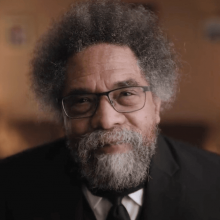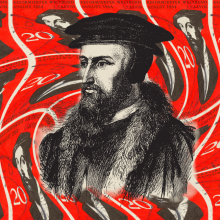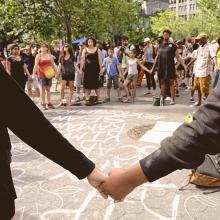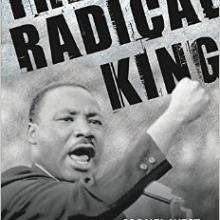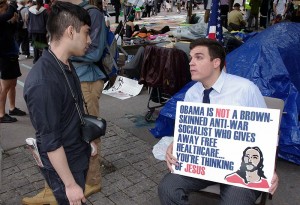cornel west
Cornel West, a progressive political activist and philosopher, announced on Monday that he is launching a third-party 2024 bid for the U.S. presidency.
PUBLIC EDUCATOR AND philosopher Cornel West has spoken about the difference between optimism and hope. Optimism, as he understands it, can point to empirical evidence that suggests things will get better, while hope can exist without any of that. Even when nothing around us points to a bright future, hope defiantly holds on for a better day. Baptist minister and social ethicist Miguel A. De La Torre argues in his book Embracing Hopelessness that hope is often used as a tool of oppression and pacification. For him, hopelessness can be an animating force for justice because a deep enough dissatisfaction with the status quo will move us to change it.
I find resonance and challenge in both of these dear teachers’ perspectives. Very little of our time suggests that things are progressing the way they should. The status quo is untenable and must be changed. Both perspectives remind us not to trust or be satisfied with the way things are. We must find motivation to build the world we need rather than accepting the one we have. For many Christians, October begins with World Communion Sunday and ends with All Hallows’ Eve and Reformation Day. We celebrate our eucharistic ties to Christians around the world, recognize the great cloud of witnesses and saints who have gone before, and commemorate one of the many movements in church history that have pushed us toward something new. We live in a time when very little resembles what we knew just a few years ago. How might our texts help us build for what is coming?
My school tried to purge any evidence of liberation theologies, Christian critiques of the economy, or radical solidarity with the poor, hoping to indoctrinate students with a conservative ideology. But there was an underground community at my school that helped me make a pivotal realization: By Christian college standards, Jesus would be labeled “an extreme leftist” because he embodied class solidarity with the poor, damned the rich, and imagined an alternative community. That gospel appealed to me in college; it still appeals to me today.
As a post-evangelical, I have no interest in rehabilitating Calvin’s ideas about double predestination or his justification for the execution of Michael Servetus. Nonetheless, I’m unwilling to cast Calvin and his theological legacy in exclusively negative terms; I believe that confronting racial injustice today actually requires recuperating Calvin’s infamous doctrine of “total depravity,” or a spiritual condition staining humanity from birth. Doing so can help us better understand why both progressive and reactionary heirs to Calvinist thought fall short — and how we might work to transform our fallen world instead.
“It is our duty as white folks to dismantle white supremacy,” Caine-Conley said. “… People of color, both black and brown bodies, have been absorbing violence since our country was created as our country. Showing up in body to absorb some of that violence and tension ourselves, to put our bodies in places that black and brown people have been for centuries, is really important as we begin to dismantle white supremacy.”
“WE ARE AT the moment when our lives must be placed on the line if our nation is to survive its own folly.”
Martin Luther King Jr. gave this stinging critique of the apathetic nature of both the U.S. church and the general public more than 40 years ago. While some things have changed for the better, the truth remains that the three evils of society that King named (racism, militarism, materialism) continue to pervade U.S. culture, crippling our moral and ethical foundation.
It is difficult to imagine that someone the FBI once labeled as “the most dangerous man in America” would one day have his own national holiday. Each year we celebrate the life of King with an incomplete and romanticized retelling of the impact he had on society during and after the civil rights movement. He dreamed of a better nation, but what was it about his dream that made him a nightmare to the U.S. government?
CORNEL WEST and Christa Buschendorf have collaborated to bring forth a powerful look at the visionary legacies of 19th- and 20th-century African-American leaders. Black Prophetic Fire consists of six conversations between West and Buschendorf, each one focusing on a different black prophetic figure: Frederick Douglass, W.E.B. Du Bois, Martin Luther King Jr., Ella Baker, Malcolm X, and Ida B. Wells. In the book, West displays his wealth of knowledge and understanding of those prominent historical black icons and their movements.
For West, U.S. society has arrived at a pivotal point. He sees the “black embrace of the seductive myth of individualism in American culture” as reason enough to ask tough reflective questions such as, “Are we witnessing the death of black prophetic fire in our time?” and “Have we forgotten how beautiful it is to be on fire for justice?”
West is known as an intellectual and activist who loathes the unfair treatment of people anywhere, regardless of their race, gender, sexual orientation, or religious creed. His message of love, particularly for the younger generations, becomes the undertone of this book. Throughout the years, the black prophetic tradition has seen a decline in exemplars of integrity. West presents the conversations he had with Buschendorf as a history lesson and a call to younger generations to not let this tradition fizzle out.
From Salon yesterday:
Last Friday, the U.S. Government announced that 7.2 percent of Americans in the labor force earn so little that they are living in poverty. Reuters noted that the percentage of the working poor is the highest in at least two decades. The rate was 7 percent in 2009, 5 percent in 1999, and 5.5 percent in 1987.
Read the full story here
The legacy of Martin Luther King, Jr., and the reality of climate change are both victims of western culture’s remarkable capacity to accommodate and neutralize that which is most critical of it.
Early in the civil rights movement, Bayard Rustin said to King, “I have a feeling that the Lord had laid his hand upon you. And that is a dangerous, dangerous thing.” Similarly, the FBI once described Martin King as the “most dangerous man in America” – and yet, as Martin Luther King Jr day rolls around again in the United States, we are often presented with a figure that seems more like a cheerleader for the status quo rather than a prophetic challenge to it. Somehow, it seems we have made this dangerous figure very safe.
For instance, in a speech at the Pentagon commemorating King’s legacy, the Defense Department’s general counsel Jeh C. Johnson remarked, “I believe that if Dr King were alive today, he would recognize that we live in a complicated world, and that our nation’s military should not and cannot lay down its arms and leave the American people vulnerable to terrorist attack.”
But to claim that Dr King would be pro-war today is as likely as him being pro-segregation. After all, this is the Dr King who said, “A nation that continues year after year to spend more money on military defence than on programs of social uplift is approaching spiritual death.” And this is the same Dr King who said in his speech on 4 April 1967 (a speech that turned three quarters of American public opinion against him), “To me the relationship of the ministry [of Jesus Christ] to the making of peace is so obvious that I sometimes marvel at those who ask me why I’m speaking against the war.” And this is the same Dr King who said, the night before he was murdered on 4 April 1968, “It is no longer a choice, my friends, between violence and nonviolence. It is either nonviolence or nonexistence.”
Coptics Fear Islamists Will Sweep Egypt Elections; Why Columbus, Ohio, Needs Somali Cops On Its Force; Anti-Mormon Bias Persistent In Presidential Politics; Rampant Levels Of Poverty In Florida Force Families To Live In Cars; Religion: A Growing, Changing God Lobby In D.C.; Poll Numbers Suggest Gingrich’s ‘Humane’ Immigration Stance Could Help Him; How 2008 Radicalized Me; Cornel West: Ultimate Fight For Entitlements Will Be In "The Streets"
SMILEY: I'm still going to finish my point. You're right to go after Stanley O'Neal. I know you didn't mean to do this. I don't want to believe you meant to do this, but Stanley O'Neal, there are four or five black CEOs in this country. You choose a guy at Merrill Lynch to make him the poster guy for all the folks on Wall Street.
O'REILLY: Oh Tavis knock it off with the black business, will you? Oh stop.
Tavis Smiley and Cornel West on poverty. The Value Voters Summit. U.S. Catholic Bishops remind Catholic voters about church teaching. Perry supporter calls Mormonism a "cult." Ron Paul wins Value Voter straw poll, with Cain in second place. Mitt Romney and religious bigotry. Ghana church says poverty "causes" homosexuality. Fox News attacks Lily the new Sesame Street poverty Muppet as "liberal bull." And Newt Gingrich says candidates are "not running for theologian-in-chief."
"OK to all those attacking Tavis and Dr. West and me for hosting the Poverty tour, can you get off your Hating a second to look at todays latest report: POVERTY is at its highest record in American History!!! People are Dying out here! Don't care what you think of Tavis, Cornel or me, but PLEASE PLEASE care about our Brothers and Sisters who have been made to feel invisible and disposable!"
-- Rev. Michael Pfleger, pastor of the Faith Community of St. Sabina, a Roman Catholic parish on Chicago's South Side, in a posting on his Facebook page Wednesday morning.
Broadcaster Tavis Smiley and Princeton professor Cornel West just wrapped up their 18-city "Poverty Tour." The aim of their trip, which traversed through Wisconsin, Detroit, Washington, D.C., and the Deep South was to "highlight the plight of the poor people of all races, colors, and creeds so they will not be forgotten, ignored, or rendered invisible." Although the trip has been met with a fair amount of criticism, the issue of poverty's invisibility in American media and politics is unmistakable. The community organizations working tirelessly to help America's poor deserve a great deal more attention than what is being given.
The main attack against the "Poverty Tour" is Smiley and West's criticism of Obama's weak efforts to tackle poverty. For me though, what I would have liked to see more is the collection of stories and experiences from the people West and Smiley met along their trip. The act of collective storytelling in and of itself can be an act of resistance.
